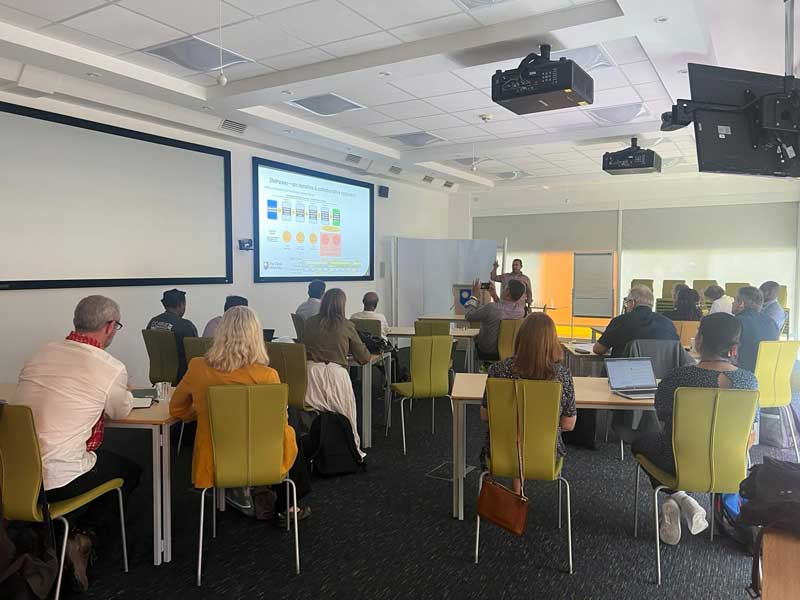Sharing insight and experiences from teacher professional development research

The Executive Dean at the OU recently welcomed colleagues from partner institutions in South Asia, including Prof Vikas Maniar from the Tata Institute of Social Sciences, India and Prof Dr Md. Abdul Halim, Prof Dr S M Hafizur Rahman, and Prof Mohammad Nure Alam Siddique from the Institute of Education and Research, University of Dhaka, Bangladesh.
They shared insights from their teacher professional development (TPD) research projects – Prof Maniar on Connected Learning for STEM (CL4STEM) and Prof Dr Md. Halim, Prof Rahman, and Prof Siddique on 3MPower (Mobile Learning for Empowerment of Marginalised Mathematics Educators in Bangladesh) at a seminar hosted by the Centre for the Study of Global Development in September 2023.
The CL4STEM project is a unique collaborative effort between teacher education institutions in Bhutan, Nigeria, Tanzania, and India. This project is being funded by the Global Partnership for Education Knowledge and Innovation Exchange (GPE KIX). It focuses on leveraging technology to enable TPD at scale.
TPD often takes a scripted and instructive approach, and the CL4STEM project team questioned if this approach produced sustainable change. They argued for a TPD model that encouraged dialogue and respected teachers as professionals. This approach shaped the CL4STEM model as it aims to pilot a scalable and sustainable TPD model that can address improving teachers' knowledge, attitudes, and practices through reflection and dialogue.
The CL4STEM team’s approach is that teachers are motivated to make changes as they see their teaching become more meaningful to their students, and they focus on enhancing inclusion in classrooms or moving towards equity in learning.
Prof Maniar shared what they had learnt from delivering CL4STEM. They noticed that working with teachers, administrators, and policymakers alone was insufficient. Building relationships and capacity strengthening with teacher educators and unions was essential to enable sustainable change, building institutional memory of the core ideas.
The CL4STEM project team also learnt that it was vital that they aligned the project with teachers’ working conditions. They ensured that the recommended practices were easy to use, so teachers were more likely to apply them. They implemented the innovation across different countries, so it was essential to ensure fidelity to the principles of the programme, not the design, i.e. there is adaptation across contexts. The team also encouraged the development of communities of practice so teachers could learn from each other.
The 3MPower research team, funded by the EdTech hub, shared what they learned using a participatory ethnographic (PEER) approach in their teacher education research. The PEER approach meant that the stories of the experiences of maths teachers in marginalised communities were the driving force in the project.
However, they faced challenges scheduling conversations with teachers due to their schedules and poor phone network. Peer researchers collected much of the data in the evenings or at weekends when their peers were free from other professional tasks to mitigate these challenges.
A seminar attendee asked if peer researchers had had opportunities to share how working as researchers has shaped their teaching. The 3MPower group mentioned that reflecting on research practice was essential to their research study group, an area they intended to explore further with peer researchers.
A common theme in both presentations was the role of communities of practice in TPD. The 3MPower team noted that when participants are often not vocal in communities of practice, it does not mean they are not learning. Sometimes, participants need more confidence to contribute to the group due to hierarchies in the communities of practice. It was noted that there is a need to nurture communities of practice to help participants feel comfortable contributing to the group. This resonated with the experiences of other participants in the seminar.
The session concluded with questions on how to sustain communities of practice when research projects end so teachers can continue to learn from each other. The seminar also provided the opportunity to meet with partners in person, which was a welcome change after several years of virtual collaboration.
Connect with us
Whatever your reasons for wanting to connect with us, you can contact us via email or social media on the addresses below
CSGD email
CSGD on Bluesky
CSGD on LinkedIn
Sign up to our mailing list to receive the latest news on our research, events and publications.
.jpg)